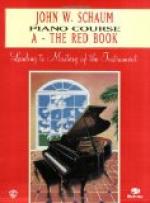“On the subject of memorizing who can lay down rules for this inexplicable mental process, which will hold good for every one? For myself, I hear the notes mentally, and know their position on the keyboard. In actual performance much must be left to finger memory, but one must actually have the notes in his mind as well as in his fingers. Before a concert I go over all my program mentally, and find this an excellent method of practise when traveling from one city to another. To those who study with me I say, you must try various methods of memorizing; there is no universal way; each must find out by experiment which is most suited to his individual case.
“With some pianists visual memory of the printed page plays the principal role in memorizing; with others visual memory of the notes on the keyboard; with still others ear-memory, or memory of the harmonic progressions. I believe in making the pupil familiar with all these different ways, so that he may find out which one is most helpful to him.
“For pupils with weak hands and arms I recommend simple gymnastic exercises to be done morning and evening. Physical strength is a very necessary essential for a brilliant technic; the student who would accomplish big things must possess it in order to succeed.
KEEPING TECHNIC IN REPAIR
“The only way to keep one’s technic in repair is to be constantly working at it. Technic is the mechanical part of music-making; to keep it in good working order one must be constantly tinkering with it, just as the engine driver tinkers with his locomotive or the chauffeur with his automobile. In the course of his technical study every intelligent pupil will recognize certain exercises which are particularly important for the mechanical well-being of his playing; from these exercises he will plan his daily schedule of technical practise.
“In order to keep a large repertoire going at the same time, one must have a weekly practise plan, which will allow for a frequent repetition of the pieces. Those pieces which have been recently added to one’s list will require more frequent repetition, while those which have been played for a longer period may be left for an occasional brushing up. Frequent playing before others, either publicly or privately, is above everything else to be recommended to the pianist, as the greatest incentive to keeping up his repertoire and toward growing in his art.
AMERICAN VERSUS EUROPEAN CONDITIONS
“In America many people who have little talent study music, intending to make it their profession; whereas in Europe there is such a profusion of music and music-making that only those of more than average gifts think of making music their life work. In America we are still ’in the making,’ from a musical standpoint, and although we have accomplished much there is still much to be done. It is the office of the piano teacher in America to make music study easy and interesting to pupils of moderate ability. Just these conditions have brought about very excellent methods of piano and music study for American children, which have no counterpart in Europe.”




